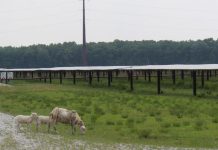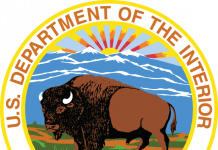
On Tuesday, the House voted to approve the Water Resources Reform and Development Act (WRRDA), a fiscally responsible bill that improves our nation’s water transportation infrastructure, cuts government red tape, and helps create much needed jobs.
After passing the House in October by a bipartisan vote 417-3, the House and Senate moved to a conference committee to iron out the final details. Dr. Bucshon was appointed as a conferee to help negotiate a fiscally responsible deal that benefits Indiana’s ports and waterways and creates jobs all without a single earmark, a first for the bill.
“I’m proud to have worked with my colleagues on both sides the aisle on a bill to meet the needs of our water transportation infrastructure,†said Dr. Bucshon. “The WRRDA bill helps the private sector create jobs and grow our economy by cutting red tape and expediting the environmental review process. We also invest in maintenance and funding for ports, like our very own Mt. Vernon Port, that are often underfunded to ensure safety and maintain competitiveness. At the same time the bill is fiscally responsible, does not include any earmarks, and deauthorizes $18 billion in old, inactive projects. WRRDA will undoubtedly help Indiana and I look forward to a Senate vote and the President’s signature.â€
Bucshon’s work was also praised by Committee Chairman, Bill Shuster.
“We set out to draft a fiscally responsible bill to ensure our country has an efficient and effective water transportation system and we accomplished that goal with WRRDA,†said Rep. Bill Shuster, Chairman of the Transportation and Infrastructure Committee. “Dr. Bucshon has been a valuable member of our committee and I thank him for his hard work to negotiate the final details of this bill.â€
Senate approval is expected by the end of the week. WRRDA will then move to President Obama’s desk for his signature.
BACKGROUND:
The Mt. Vernon Port in Southwestern Indiana handles between 3 and 5 million tons annually, and is ranked as the 6th largest inland port in the US by ton-miles.
Speaker of the House, John Boehner, released a comparison of the 2007 water resources bill and today’s demonstrating that the bill has gone from “an Earmark Haven to a Jobs Bill.â€
WRRDA 2014 Highlights (Courtesy the Transportation Committee):
The Water Resources Reform and Development Act of 2014 is one of the most policy and reform focused measures of its kind in the last two decades. WRRDA streamlines the project delivery process, promotes fiscal responsibility, and strengthens our water transportation networks to promote competitiveness, prosperity, and economic growth. WRRDA contains no earmarks and makes major reforms to increase transparency, accountability, and Congressional oversight in reviewing and prioritizing future water resources development activities.
Reforms Bureaucracy, Accelerates Project Delivery, and Streamlines Environmental Reviews
· Sets hard deadlines on the time and cost of studies
· Consolidates or eliminates duplicative or unnecessary studies and requires concurrent reviews
· Streamlines environmental reviews and improves coordination
Fiscally Responsible
· Deauthorizes $18 billion of old, inactive projects that were authorized prior to WRDA 2007
· More than fully offsets authorizations with deauthorizations
· Sunsets new authorizations to prevent future project backlogs
· Reduces the inventory of properties that are not needed for the missions of the Corps
Strengthens Oversight, Transparency, and Accountability
· NO earmarks
· Establishes a new, transparent process for future bills to review and prioritize water resources development activities with strong Congressional oversight
Increases Flexibility for Non-Federal Interests and Leverages Private Sector Investments to Multiply the Effect of Federal Funding
· Maximizes the ability of non-federal interests to contribute their own funds to move studies and projects forward
· Expands the ability of non-federal interests to contribute funds to expedite the evaluation and processing of permits
· Establishes a Water Infrastructure Public Private Partnership Program and new options to expand the local role in project implementation
· Creates innovative methods to invest in and finance water resources infrastructure and municipal drinking water and wastewater needs
Enhances Safety and Protects Communities
· Strengthens dam and levee safety
· Improves Army Corps of Engineers responses to extreme weather events
· Encourages resilient construction techniques and the use of durable, sustainable, and innovative materials
Improves Competitiveness, Creates Jobs, and Strengthens Water Resources Infrastructure
· Authorizes needed investment in America’s ports, strengthens ports that move the majority of the Nation’s commerce, and ensures equity for those ports that contribute the most to the Harbor Maintenance Trust Fund
· Supports underserved, emerging ports
· Reforms and preserves the Inland Waterways Trust Fund
· Authorizes priority water resources infrastructure improvements recommended to Congress by the Chief of the Army Corps of Engineers to improve navigation and commerce and address flood risk management, hurricane and storm damage risk reduction, and environmental restoration needs





Since if Romney would have been elected, you would have been voting to spend on infrastructure all over the damn place. Like McCain said, “Like a drunken sailor.”
But since the mulatto kicked ass, your Party has finally decided to cave after 5 years on some water projects.
Good deal.
I hope you use some of it to clean your ears out.
ribbit……….
Don’t cha love it when R’s thump their chest for shit they should be doing anyway?
Hey look I showed up for work, for once, give me a freakin’ medal!
Since it’s late Brains and this is only between you and me, can you imagine how much better the economy would be if Federal spending would have been the same under Obama as it was with Reagan?
I remember all the power plants (around here) and all over the country being built when The Gipper took over.
I’ll always wonder who started them.
nite………..
http://www.washingtonpost.com/blogs/wonkblog/wp/2013/01/31/charts-what-if-obama-spent-like-reagan/
Comments are closed.